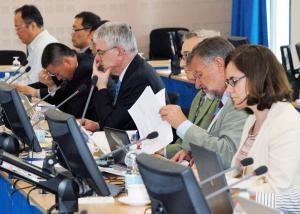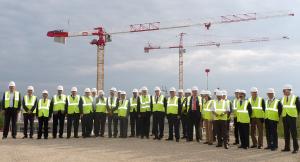Comprehensive check-up and recommendations
13 May 2011
-
David Campbell, Deputy Directorate Head, Plasma Operation Directorate
The STAC received updates on a variety of issues and provided valuable feedback to the ITER management.
Leading scientists and engineers from the ITER Members' fusion communities assembled at the Cadarache Château this week to review the progress that the project is making in key areas of science and technology. Led by their Chair, Yuanxi Wan of China, and Vice-Chair, Minh Quang Tran of the European Union, the members and experts of the Science and Technology Advisory Committee (STAC) dealt with a series of "charges," or action topics, which had been issued by the ITER Council at its seventh meeting in November 2010.
These action topics included reviews of the technical content of the project's ongoing cost containment activities, progress on the development of the radiofrequency heating systems and of the in-vessel coil systems, results of analysis of the ITER reference plasma scenarios, and the status of R&D on the ITER disruption mitigation system.
The ITER Organization's contribution was led by Director-General Osamu Motojima, who gave a comprehensive presentation reviewing the current status of the project and highlighting significant areas of recent progress. This was followed by a series of detailed presentations by ITER Organization staff responding to the Council's charges. Two additional issues of particular interest to the STAC members were presented: reports on the progress of the ITER schedule, and the status of R&D on the superconductor under development for the central solenoid.
While in Cadarache, the STAC participants also took the opportunity to visit the ITER site and see the progress which is being made in the construction of the ITER facility.
In its response to ITER management, the STAC encouraged the ITER Organization to pursue measures to deal with the potential delays which have emerged in the construction schedule. The STAC also supported the ITER management's proposals to resolve the cause of unexpected results in recent performance measurements of samples of the central solenoid superconductor.
The STAC also received updates on a variety of issues that had been discussed at earlier meetings, such as design and R&D activities supporting the development of the ITER diagnostic systems, aspects of the ITER Research Plan, the final specification of toroidal field ripple in ITER, and the possibility of using the in-vessel coil systems to control resistive wall modes and correct error fields.
In a series of breakout sessions, STAC members and experts took the opportunity to discuss several of these topics in greater depth with members of the ITER Organization. In the course of these discussions, STAC participants provided valuable feedback on areas where further analysis or R&D could strengthen the basis for performance projections to ITER and reduce uncertainties in meeting system requirements. STAC gave a comprehensive summary of its main recommendations in its response to ITER management on the third day of the meeting.
Further details of these recommendations will be provided in the final report which will be presented to the eighth meeting of the ITER Council in Aomori, Japan, on 14-15 June.



